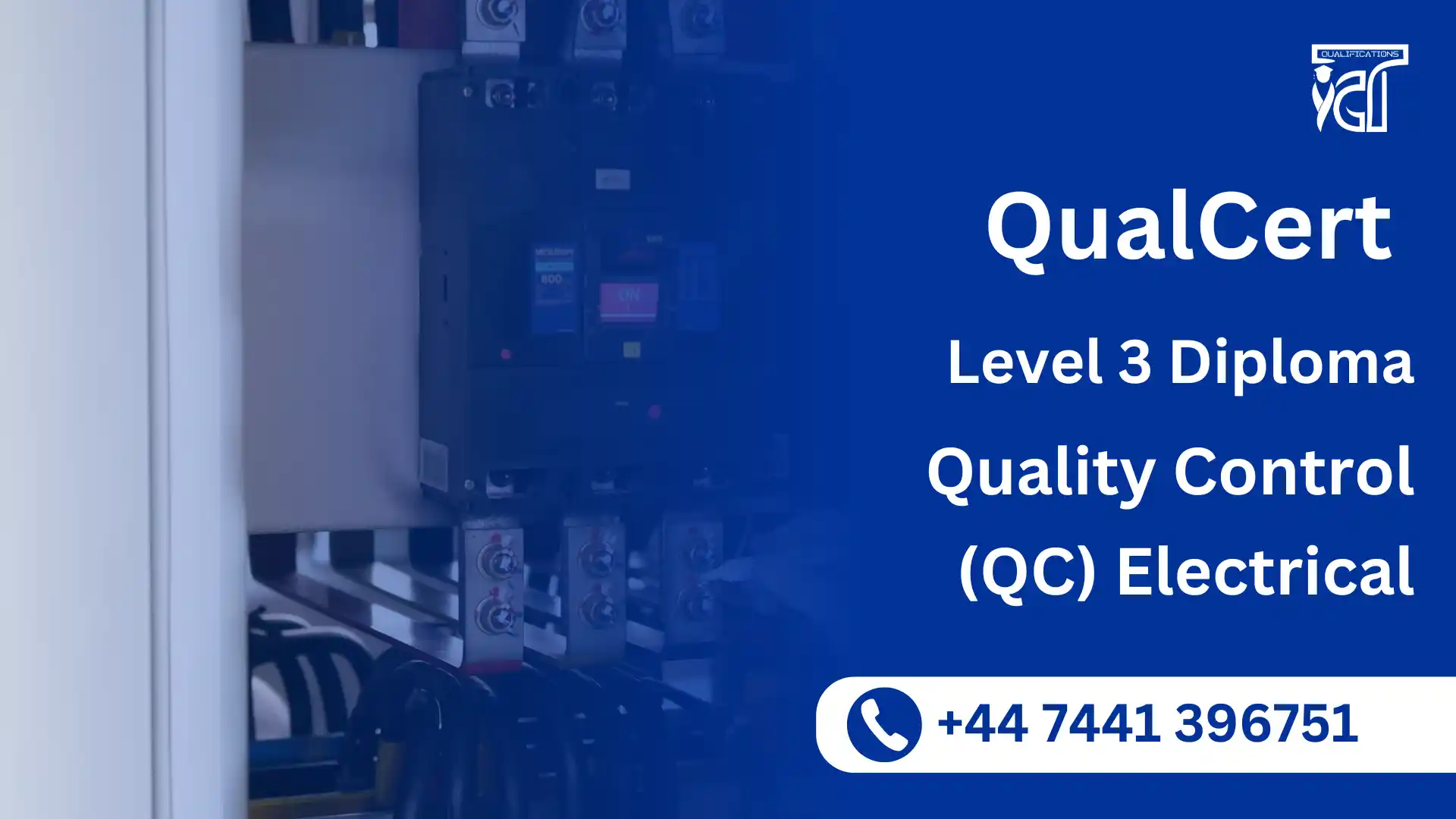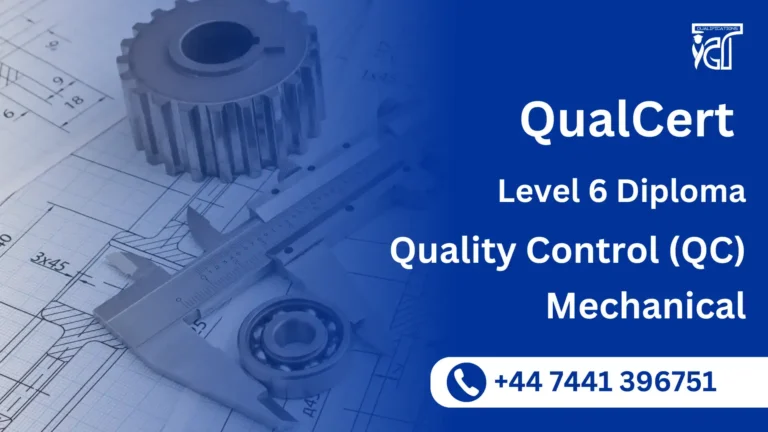The QualCert Level 3 Diploma in Quality Control (QC) – Electrical is an entry-level qualification designed to introduce learners to the essential practices, tools, and standards used in quality control within the electrical engineering sector. This course provides a strong foundation in electrical inspection, basic testing procedures, safety compliance, and documentation, preparing learners for supportive roles in QA/QC teams.
Ideal for individuals new to the industry, this diploma focuses on practical knowledge, including how to identify defects, follow inspection checklists, and assist in ensuring that electrical systems meet required standards. Emphasis is placed on real-world applications, workplace safety, and the importance of accurate reporting.
Whether you’re a recent school graduate, a vocational trainee, or someone looking to begin a career in electrical quality control, this course offers the technical grounding and confidence needed to start working in roles across construction sites, industrial facilities, or maintenance teams.
QualCert Level 3 Diploma in Quality Control (QC) Electrical
The QualCert Level 3 Diploma in Quality Control (QC) Electrical comprises several study units designed to provide learners with a comprehensive understanding of QC principles and practices in the electrical sector. Below is the qualification structure, including the Total Qualification Time (TQT) 300, Guided Learning Hours (GLH) 210, and 60 Credits associated with the program.
| Unit Ref# | Unit Title | Credit | GLH | TQT |
| QC100009 – 1 | Electrical Quality Control Systems | 10 | 35 | 50 |
| QC100009 – 2 | Electrical Circuit Testing and Inspection | 10 | 35 | 50 |
| QC100009 – 3 | Health, Safety, and Risk Management | 10 | 35 | 50 |
| QC100009 – 4 | Calibration and Electrical Equipment Management | 10 | 35 | 50 |
| QC100009 – 5 | Documentation and Reporting in Electrical QC | 10 | 35 | 50 |
| QC100009 – 6 | Standards and Codes in Electrical Engineering | 10 | 35 | 50 |
GLH (Guided Learning Hours) and TQT (Total Qualification Time) are terms commonly used in vocational qualifications to help define the amount of time a learner is expected to spend on their studies.
1. GLH (Guided Learning Hours)
GLH refers to the number of hours a learner spends being directly taught, supervised, or supported during their course. This includes the time spent in activities such as:
- Classroom instruction
- Practical workshops
- One-on-one tutoring or mentoring sessions
- Online learning sessions with tutor support
In other words, GLH represents the time that learners are actively engaged with their instructors or learning activities.
2. TQT (Total Qualification Time)
TQT represents the total amount of time a learner is expected to invest in completing a qualification, including:
- GLH (Guided Learning Hours): Time spent on direct learning, as explained above.
- Self-Directed Learning: This includes time spent on independent study, research, assignment completion, preparation for exams, and any other work the learner does outside of direct teaching hours.
TQT is a broader measure that includes all the time required to achieve the qualification. It helps learners and employers understand the overall commitment required for the qualification.
Key Differences Between GLH and TQT:
- GLH focuses on direct learning with guidance or supervision.
- TQT includes GLH as well as independent study time and other learning-related activities.
Example:
If a qualification has a TQT of 600 hours and a GLH of 250 hours, it means the learner should spend 250 hours in direct learning (classroom, online, or tutor-led sessions) and 350 hours on independent study or research.
Electrical Quality Control Systems
- Understand the core principles and role of quality control in electrical engineering.
- Learn how to implement structured QC procedures for electrical systems and components.
- Build the ability to monitor quality performance and support continuous improvement efforts.
- Identify common QC issues in electrical work and apply practical solutions to address them.
Electrical Circuit Testing and Inspection
- Develop skills to perform accurate testing and inspection of electrical circuits.
- Detect faults, safety hazards, and non-compliance in electrical installations.
- Use standard tools and equipment for circuit evaluation and fault diagnosis.
- Learn to complete test documentation to support reporting, compliance, and traceability.
Health, Safety, and Risk Management
- Gain a solid understanding of health and safety regulations in the electrical sector.
- Learn how to identify workplace hazards and implement risk control measures.
- Understand emergency protocols and safety procedures for accident prevention.
- Promote safe practices and contribute to a compliant working environment.
Calibration and Electrical Equipment Management
- Learn the fundamentals of calibrating electrical tools and measuring instruments.
- Understand how to manage, maintain, and store equipment for accuracy and safety.
- Identify and resolve basic calibration errors to maintain system reliability.
- Develop practical maintenance techniques to prolong the service life of tools and devices.
Documentation and Reporting in Electrical QC
- Acquire skills in accurately documenting inspection and testing activities.
- Understand the importance of recordkeeping for quality control and regulatory audits.
- Learn to prepare concise, professional reports for supervisors, clients, and compliance bodies.
- Use digital tools and formats to streamline quality control documentation and communication.
Standards and Codes in Electrical Engineering
- Explore key national and international codes governing electrical engineering practices.
- Learn to interpret and apply standards such as IEC, NEC, or local regulations in quality control.
- Understand compliance requirements for installations, maintenance, and safety.
- Ensure quality assurance processes align with legal and industry-specific standards.
Course Benefits: QualCert Level 3 Diploma in Quality Control (QC) – Electrical
✅ Foundational Knowledge in Electrical QC
Gain a solid grounding in electrical quality control practices, standards, and inspection methods, preparing you for a career in the QA/QC field.
✅ Industry-Relevant Skills
Learn hands-on skills in electrical testing, calibration, equipment management, and documentation—essential for real-world roles in construction, maintenance, and industrial sectors.
✅ Improved Employability
Enhance your career prospects by acquiring skills that are highly valued in the electrical and engineering industries, including safety compliance and fault detection.
✅ Workplace Safety Awareness
Understand critical health and safety regulations, risk management strategies, and how to contribute to a safer work environment in electrical settings.
✅ Practical Learning Approach
Benefit from practical, application-focused training that prepares you to handle everyday quality control tasks and contribute effectively to QA teams.
✅ Stepping Stone for Advanced Studies
Use this diploma as a pathway to higher-level qualifications in electrical engineering, quality assurance, or project supervision.
✅ Recognition and Career Growth
Achieve a recognized qualification that can help you secure junior QA/QC roles and build a foundation for career advancement in technical or supervisory positions.
This course is designed for individuals who are:
Aspiring Electrical Technicians or QC Assistants
Beginners aiming to enter the field of electrical engineering or quality control with a focus on technical accuracy and compliance.
New Entrants to the Electrical or Construction Industry
Those starting their careers in construction, maintenance, or electrical services and seeking foundational knowledge in quality control processes.
Recent School or College Graduates
Individuals who have completed secondary education and wish to gain a practical, career-oriented qualification in electrical quality assurance.
Junior QA/QC Staff or Site Support Workers
Personnel already working in the field at an assistant level who want to formalize their skills and advance into more responsible QA/QC roles.
Vocational Learners or Technical Training Seekers
Those looking for practical, job-ready skills without pursuing a traditional academic route.
International Students or Professionals Seeking Certification
Learners from overseas or other industries wanting to enter the electrical QC field with a recognized qualification.
Entry Requirements
Entry Requirements: QualCert Level 3 Diploma in Quality Control (QC) – Electrical
To enroll in this qualification, applicants should meet the following criteria:
Register Now
Qualification Process
Qualification Process for the QualCert Level 3 Diploma in Quality Control (QC) Electrical
- Self-Assessment:
Begin by evaluating your eligibility to ensure you meet the qualification requirements, including work experience, knowledge, and language proficiency. - Registration:
Complete your registration by submitting the required documents, including a scanned copy of a valid ID, and paying the registration fee. - Induction:
An assessor will conduct an induction to confirm your eligibility for the course and explain the evidence requirements. If you do not meet the criteria, your registration will be canceled, and the fee will be refunded. - Assignmnets & Evidence Submission:
Provide all assignmnets and the necessary evidence based on the assessment criteria outlined in the course. If you are unsure of the required evidence, consult with the assessor for guidance on the type and nature of evidence needed. - Feedback and Revision:
The assessor will review your submitted evidence and provide feedback. Evidence that meets the criteria will be marked as “Criteria Met,” while any gaps will be identified. You will be asked to revise and resubmit if needed. - Competence Evidence:
Submit final evidence demonstrating that all learning outcomes have been met. This evidence will be marked as “Criteria Met” by the assessor once it is satisfactory. - Internal Quality Assurance (IQA):
The Internal Quality Assurance Verifier (IQA) will review your evidence to ensure consistency, quality, and compliance with standards. - External Verification:
The IQA will submit your portfolio to QualCert External Quality Assurance Verifiers (EQA) for final confirmation. The EQA may contact you directly to verify the authenticity of your evidence. - Certification:
Upon successful completion of all checks, QualCert will issue your official certificate, confirming that you have attained the QualCert Level 3 Diploma in Quality Control (QC) Electrical.







